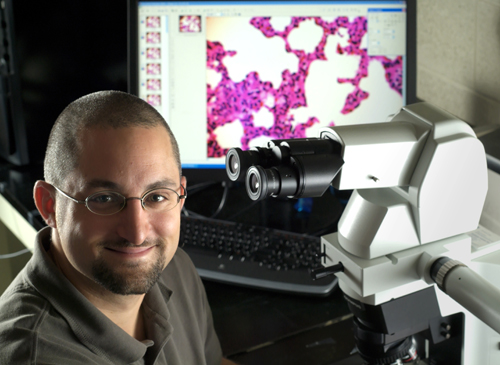
Ontario Veterinary College (OVC) pathologist Brandon Lillie is taking an innovative approach to studying how proteins and gene defects influence disease resistance in farm animals.
“Infectious respiratory and enteric diseases are a major cause of economic losses and animal suffering in the Canadian livestock industry,” said Lillie. “The long-term goal of my research program is to develop novel genetic markers that will help producers breed animals that are more broadly resistant to disease.”
He joined the OVC faculty in 2009, but Lillie’s connections to U of G started much earlier. His father earned a veterinary degree in 1966 and a master’s degree in pathology in 1970. His mother is also a Guelph grad, receiving a B.H.Sc. in 1967, a master’s degree in family studies in 1970 and a PhD in 2008. “My father is a veterinary pathologist, and I always knew that’s what I wanted to do, too,” says Lillie.
Born in Winnipeg and raised in Vegreville, Alta., he had moved to Milton, Ont., with his family by the time he was university age, and Guelph was a natural choice. After a year of undergraduate studies in biomedical sciences, he was accepted into the DVM program and graduated in 2000.
Lillie started in a master’s program in veterinary pathology but later switched to the PhD program and did both the research component and training in veterinary anatomic pathology at the same time. As a result, he now has board certification in vet pathology. He then worked as a clinical instructor and did a year of post-doc research at OVC before obtaining his faculty position.
Lillie’s research is focused on identifying proteins involved in innate disease resistance in pigs, cattle and horses. He’s also assessing the role that defects in the genes involved in immune function play in the wide variation in resistance to infectious diseases observed in livestock.
Concerns about rising levels of antibiotic resistance have led policymakers and producers to look for ways to curb the use of antibiotics on farms. So there may be economic value in selecting animals that are more robust – in terms of resistance to disease – rather than those that are simply the most “productive” in terms of meat or dairy production or reproductive capacity, he added.
Lillie’s work will benefit from new gene sequencing equipment that can rapidly generate data by sequencing large amounts of DNA simultaneously. He aims to identify and characterize proteins that recognize common patterns on the surfaces of infectious pathogens. These proteins, including collagenous lectins, play a key role in innate disease resistance in humans and animals, and deficiencies have been shown to increase the risk and severity of infections.
In previous work with pigs, Lillie identified some of these proteins and found genetic variations that are more frequent in animals that became ill with diseases such as pneumonia and enteritis. But little is known about these proteins in other domesticated large animals, he said.
“These comparative studies will benefit the livestock industry and maybe humans as well since they will improve our understanding of the complex molecular pathways involved and the genetic mechanisms regulating innate disease resistance that are common to humans and production animals.”